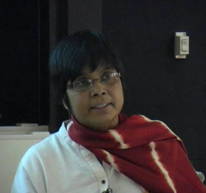

]Another point that is worth making here is that young people were not simply moving to Islamic marriage as a way of running away from western immoral values etc. Insisting on a good Muslim fo ra husband can as a way of guarding against unwelcome marriages that might be arranged by their parents. So many of my interviewees said that their parents would like them to marry another Bangladeshi, and whether or not that Bangladeshi was a good practising Muslim was not really an issue for their parents. And yet, for the girl herself, whether the husband was Bangladeshi, Pakistani, Iranian, Somali, British, convert or not, did not really matter so much. What they wanted a good Muslim. So my female interviewees were often using Islam and their Islamic piety as a way of countering their parents' pressure to marry someone the parents had chosen.
One could say that the rejection of western values and embracing of an Islamic way of life does in some way provide a common ground on which the younger and older generation can come together in discussing and solving the problems they are facing. In fact, it can be a very creative way of dealing with a often difficult situation.
I'm running out of time so I will try to bring this to an end. I would like to say that all this I have been talking about, the confusion, conflict between the two generations, and resistance against the west, all this needs to be understood within the wider socio-cultural context. And we know that in the good old days marriages used to be arranged between parents, meaning the bride and groom's parents. Of course, one person marries another person, but in the South Asian context, the first thing is what is the other family like, you don't think about the individual, or you didn't think about the individual. So the individual choice was very not very important. Now, within these changing circumstances, we are now moving away to more individualistic choices, nuclear families etc. there seems to be a veering away from the wider extended family.
There are pluses and minuses of these changes of course. People are having to make decisions on their own and deal with complex situations on their own. But most of all, there is also a source of tension in this. You move away from the affairs of the extended family, but there are consequences for this. There are a lot of problems between the younger and older generation because of this.
Modern society is based on the individual, not the extended family. And yet people's feelings, emotions and way of life must change, but to change to what or where to? I would like to argue that the new Islamic movements are providing a way to manage and direct that change.
Perhaps one can talk here about an alternative modernity. Western society provides a model for modernity based on consumption, advertising, the media, and a vision of personal freedom and liberation. All of this has problems, especially the ideas of freedom and liberation, which are perceived as leading to all sorts of immoral behaviour. That's one of the major concerns on the part of Islamic families. The new Islamic movements are presenting an alternative vision, one which is based on the Qur'an and the life of the Prophet Mohammad, and in which the central value is not freedom, but finding your place within the pattern of life ordained by Allah. And only time will show whether this will become a significant alternative within Western society, and within Bangladesh itself.